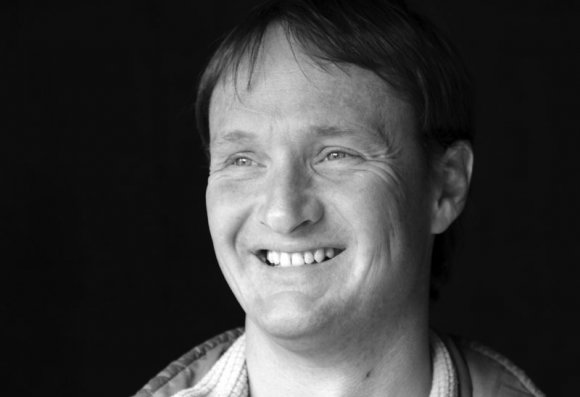Lars Theiler

Lars Theiler, mountain guide
I’ve always been attracted to making a livelihood in the mountains, but to become a mountain guide you must have either the Baccalaureate or be in possession of what we call the Certificat Fédéral de Capacité, a Swiss certificate of skills. Being also attracted to design, technology and construction, I did an apprenticeship to be a draughtsman in civil engineering. Then, gradually, the mountains became more tempting. And at least I had a trade to fall back on. I’ve successfully completed all the levels as a ski teacher, including a licence for training other teachers, as well as obtaining my certificate as a mountain guide (which took three years) and also as head of security for swiss ski installations.
Head of security ?
I certify the safety of the ski-pistes. I’m the one who authorises which pistes are safe to be open. And it’s the same procedure with private clients : it’s the guide who takes the security decisions.
It should be noted that, in February 2010, Lars was taken by an avalanche whilst working to secure the safety of the Combe d’Audon, the long ski-run down from the glacier. He ended up with fractures, but thanks to his air-bag he managed to stay on the surface. If someone of his competence can be taken by an avalanche, that ought to make people think, especially the dodgy « No Risk, no Fun » types, who sometimes require the efforts of a whole army of rescuers whose lives they put at risk.
Within our Commune, as elsewhere in Switzerland, following the drama which occurred in 1999 at Les Haudères, near Évolène in the canton of Valais, we get together at the beginning of the season to rehearse the emergency avalanche procedures, and to update the list of owners who have chalets sited in danger zones, so that everything is in place if an avalanche comes. Afterwards, it’s a matter of judgment : an avalanche isn’t mathematical. In the case of a cable supporting a gondola, you can X-ray it, count the broken strands and calculate its strength. In the case of an avalanche, there are no norms : it’s simply the judgment of a group of mountain experts, in other words human opinions. (Wouldn’t an avalanche itself be « psychotic » ?)
In my work, currently, I’m head of secruity for ski installations, but mountain guiding is my career.
What do you like about your career ?
Freedom. For someone who doesn’t want to get trapped by the call of business and of profits, it ‘s a formidable choice of career : three weeks taking clients on the Haute-Route from Chamonix to Zermatt, then I leave for Kilimanjaro with other clients, the following week it’s trecking and then climbiing in Greece.
Of course, working within nature, freedom comes at a price. First, il’s difficult to reconcile this type of career, where you are constantly far away with clients, with a balanced family life. Also, when you’re in the mountains and the weather is fine, there’s nowhere better to be ; but suddenly you can find yourself in a grave situation, just two paces away from death, given the severity of nature. The task of a guide is to determine the precise limit and not to go past it. Many times we stop before the summit. When on the mountain, intelligence isn’t so much about listening to your head, but your guts !
Another thing I like is that people on the mountain often drop their masks. They become more sincere and human contact becomes much more pure.
Translation : Gordon Douglas